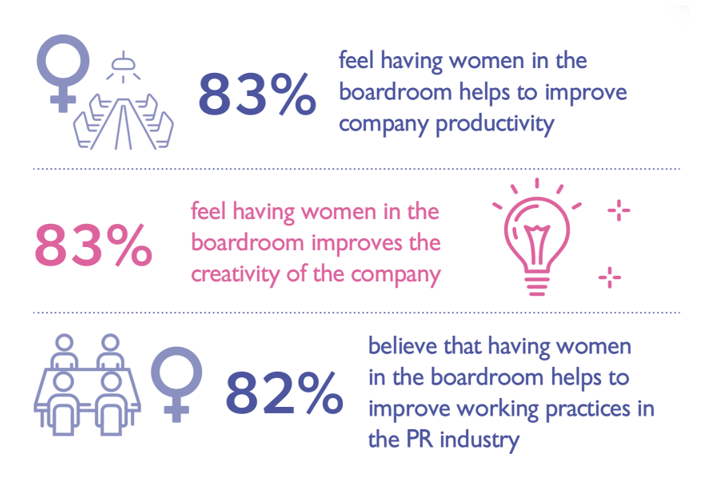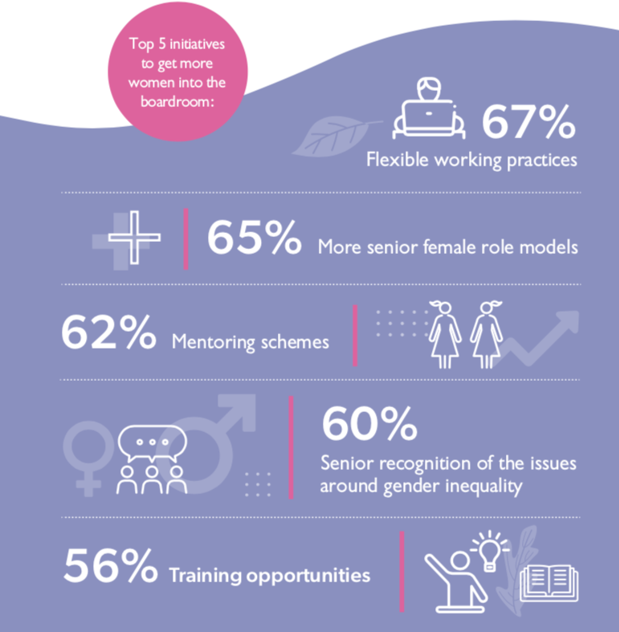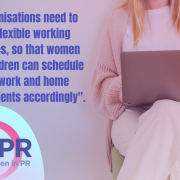GWPR Report Highlights Boardroom Barriers but Flexible Working May Accelerate Change

Angela Oakes, GWPR Co-founder & Joint President
By Angela Oakes, Co-founder & Joint President, Global Women in PR
The Annual Index is a GWPR (Global Women in PR) report measuring the position of women in PR around the world. This research-based report* is part of a five-year plan to help us understand the issues affecting women in the industry and to measure the progress towards gender equality.
We recently launched the third edition of the GWPR Annual Index and what has become increasingly clear from our annual research is that progress towards equality continues to be extremely slow. In addition, as a direct result of the Covid pandemic, the pace for driving women forward into a more balanced PR industry appears to have taken a step backwards.
When asked about the effect of the pandemic, some of the negative feedback included slower progression for women reaching leadership positions, less job security, increased stress from working 24/7 and the belief that it will take even longer to close the gender pay gap.
Without question these are serious career issues for PR women, but the effect goes beyond women.
In an industry where women make up two-thirds of the workforce, the boardroom is still predominantly male. We know from leading management consultancies, like McKinsey & Co; (Women in the Workplace 2020) that there is a direct link between boardroom diversity and a company’s financial performance. Our Annual Index research highlights the benefits to business of having women in the boardroom in terms of productivity, creativity and improved working practices.
Business Benefits

Overall, a significant 89% of respondents believe that more needs to be done to ensure women in the PR industry have greater boardroom presence.
So what should be done and what are the barriers to women entering the boardroom? Not surprisingly the biggest barrier continues to be women taking on childcare or caring responsibilities. Half of our survey respondents had children at home and two-fifths of women reported caring responsibilities had negatively impacted their career.
First and foremost organisations need to offer flexible working practices, so that women with children can schedule their work and home commitments accordingly. On a positive note this is happening much more frequently – and all thanks to Covid. 91% of respondents reported that they are currently working flexibly.
In addition remote working is on the rise – up 20% in a year. Over the next year PR professionals believe they will be working remotely 3 days a week and 21% expect to be doing this full time. Remote working is such an important benefit that more than half rank it more highly than financial reward.
 In conclusion, the acceleration of flexible, and in particular remote working, may counter some of the obstacles created by the Covid pandemic, but there is still a long way to go before PR women achieve gender equality in the workplace.
In conclusion, the acceleration of flexible, and in particular remote working, may counter some of the obstacles created by the Covid pandemic, but there is still a long way to go before PR women achieve gender equality in the workplace.
It will be fascinating to see if the long-term impact of Covid will have positively helped women in the PR workplace of the future.
* The 2021 research was conducted Summer 2021 by strategic insight agency Opinium using an online questionnaire. This year 430 PR professionals from around the world participated; over half (61%) were at director level and the vast majority (97%) were women.
About GWPR
Founded to connect, champion and support women in senior PR and Communication roles around the world, GWPR is a not-for-profit organisation driven by a desire to change the landscape for women working in our industry.



